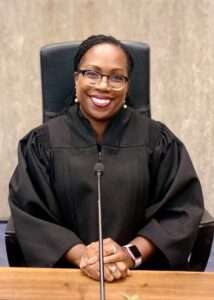Why Supreme Court Confirmation Hearings Serve Useful Purposes
The process has many flaws. But we're still better off with the hearings than we would be without them.

On Monday, the Senate will begin holding confirmation hearings for President Biden's Supreme Court nominee, Judge Ketanji Brown Jackson. Modern confirmation hearings have many flaws, and there is no shortage of critics decrying recent hearings as useless, ridiculous, a "circus," or even "verging on the absurd." Many of the criticisms are valid. For example, it's true that many of the questions and statements made by the senators are grandstanding, rather than serious examinations of the nominee's views and qualifications.
Nonetheless, I believe confirmation hearings serve a useful purpose. I explained why in an October 2020 post written at the time the Senate was considering the nomination of Amy Coney Barrett. Most of what I said remains valid today:
[T]he hearings serve useful purposes, despite their severe flaws. Requiring the nominee to run this gauntlet deters the nomination of cronies and hacks who aren't knowledgeable and smart enough to avoid looking like idiots on national TV, as well as those who lack basic knowledge of constitutional law issues. As [Adam] White puts it, " the process deters palpably unqualified nominations. Presidents know they cannot nominate a judge who cannot convey a basic understanding of the law in response to senators' questions."
The confirmation process also creates opportunities for opposing party senators (and others) to dig for possible ethical and other flaws in the nominee's background. This too helps deter some of the worst potential nominees….
I have significant disagreements with, and reservations about, all of the justices confirmed during my professional lifetime. But all are highly capable jurists, and none have turned out to be simply crude minions of whichever president or party secured their appointment. In the cases of Neil Gorsuch and Sonia Sotomayor, they have even turned out to be significantly better in some respects than I expected at the time….
In addition, the use of outside expert witnesses for and against the nominee allows those witnesses (and the senators) to call attention to important legal issues that otherwise might not get as much air time normally. I saw a small example of this myself, when I testified at then-Judge Sonia Sotomayor's confirmation hearing in 2009, becoming perhaps the first witness at such a hearing to focus on constitutional property rights issues. That I was the person testifying mattered very little. But it was notable that these important questions (eminent domain and asset forfeiture) got some national attention they might not otherwise have received. More recent confirmation hearings have featured insightful testimony on issues such as executive power, and the strengths and weaknesses of originalism and living constitutionalism.
Only a small minority of voters are likely to watch those parts of the hearings that feature outside witnesses (as opposed to the nominee herself). But that minority is still many more people than would pay attention to most such constitutional issues at other times….
And, while most of the questions and answers in confirmation hearings have little value, occasionally they do elicit some useful information. Just this week, Barrett's answers to various senators' questions provided some helpful insight on her likely approach to the Obamacare severability case currently before the Supreme Court….
It's worth noting that Barrett's answers about the Obamacare severability case did indeed prefigure her vote on that case when the Court issued its decision a few months later (she voted against the challenge brought by a coalition of red state governments and, in large part, backed by the Trump administration).
It's fine to beat up on the flaws of Supreme Court confirmation hearings. I sometimes do it myself! But it's also worth remembering that we would likely be worse off without them.
